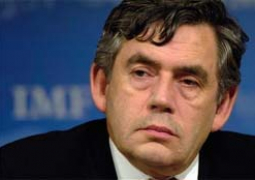Education as many say is the key to success. The Education For All Campaign Network The Gambia has shown the way by gathering stakeholders, including parents, school children and their teachers at Kwinella Upper Basic School in Region 6 to celebrate the Global Week of Action in Education 2010. The Global Campaign Network this year partnered with FIFA in the 1 Goal Campaign seizing the power of football to ensure that Education For All is a lasting impact. A sample teaching to coincide with teaching in the world was done and participants participated in the class. Society and Development takes a good look at how the campaign would help the society, since education is key.
Matarr Baldeh the National Co-ordinator of Education For All Campaign Network/The Gambia said they were celebrating in collaboration with FIFA in the 1 Goal Campaign mobilising support to hold world leaders to the promises for 2015, including to ensure that all boys and girls complete primary schooling by 2015. Also ensuring that girls have the opportunity for education at all levels by 2015. He said world leaders had promised to make sure there was enough money, and that the policies were in place to make it a reality.
"Since then many countries, including The Gambia, have abolished school fees. Education has been brought nearer to the communities, and the Gross Enrolment rates have increased and more girls are in schools," he said.
The 1 Goal Campaign, Matarr Baldeh said, is a campaign seizing the power of football to ensure that education for all is a lasting impact of the 2010 FIFA World Cup.
"Raising your voices all over the world, we believe that, together, we can make education a reality for the millions of boys and girls who remain out of school. 1 Goal is bringing together footballers, fans, charities, corporations and individuals to lobby and achieve our ambitious aim of education for everyone. By joining the 1 Goal team, you can strengthen the campaign?s voice, and give us the best possible chance of success," he said.
Matarr Baldeh said the theme, "Financing Quality Public Education: Right for All," is appropriate as the world, including The Gambia, is reeling from the aftershocks of the global financial crisis; all the more reason for the campaign to bring education financing to the fore. You can make education for all a reality by sending a reporter to cover the national highlight event scheduled to take place in Kwinella and other week-long activities," he said.
Matarr Baldeh named a Gambian football star, Abou Jammeh, as in support of the 1 Goal EFA Campaign, and urged others to support it now.
Adelaide Sosseh, the Chairperson of Education For All Campaign/The Gambia and a women's rights activist, underscored their mission and vision. She recalled that ten years ago, in April 2000, the Dakar Framework for Action and the EFA goals were agreed to by world leaders and those of CSOs. Promises, she said, were made to actualise these goals. Six months later, world leaders agreed on the Millennium Development Goals. The goals strengthen the EFA goals, ensuring the completion by boys and girls of primary school by 2015, and to make sure that girls have the opportunity for education at all levels by 2015.
"Boys and girls who were born in 2000 in The Gambia, and are lucky to be still alive, should be in Grade 3 by now if you were enrolled in school. If they stayed in school, they would be in Grade 9 in 2015," she said.
Mrs. Sosseh gave the six EFA goals including: 1) Expanding and improving comprehensive early childhood care and education, especially for the most vulnerable and disadvantaged children. 2) Ensuring that by 2015 all children, particularly girls, children in difficult circumstances and those belonging to ethnic minorities, have access to and complete free and compulsory primary education of good quality. 3) Ensuring that the learning needs of all-young people and adults are met through equitable access to appropriate learning and life skills programmes. 4) Achieving a 50 percent improvement in levels of adult literacy by 2010, especially for women and equitable access to basic and continuing education for all adults. 5) Eliminating gender disparities in primary and secondary education by 2005, and achieving gender equality in education by 2015, with a focus on ensuring girls' full and equal access to and achievement in basic education of good quality. And 6), Improving all aspects of the quality of education and ensuring excellence of all so that recognised and measurable learning outcomes are achieved by all, especially in literacy, numeracy and essential life skills.
Madam Sosseh said education is a basic human right guaranteed under the 1997 Constitution of The Gambia. Money, she said, is a major determinant and stumbling block to education, and its quality. Girls were mainly disadvantaged, but the trend has been reversed when girls' education became a priority in The Gambia. Enrolment rates are now higher for girls than boys, mainly due to the scholarship scheme.
"Governments also promised to give 20% of their national budget and 6% of the GDP to education. Efforts by the Gambian government to provide 20% of its budget have been seriously challenged by the world economic crisis, which has affected not only the ability of national governments to meet their budgetary promises, but the donors as well.
Why the 20% when there are 17 ministries all of whom need their share of the national cake? The answer is simple: education is the key to sustainable development. The quality of human resource of a nation is easily judged by the number of literate population living in it. Education in today's world has become even more vital," she said.
Madam Sosseh further said that the literacy rate stands at only 42.5% (30% for females). She urged that efforts be stepped up to become the modern economy that Vision 2020 aspires for. It, therefore, makes sense to invest in education. She further underscored the importance and benefits education can bring.
"With all this, it is not too much to ask for 20%! she declared. She stressed the importance of girls' education, and how it influences the family and the whole world."
"I support the campaign, and urge you all to support the 1 Goal Campaign," she declared.
Honourable Fatou Lamin Faye, Minister of Basic and Secondary Education, acknowledged the global level goals as enshrined in the Dakar Framework for Action 2000. She praised the enrolment evolution in the Early Childhood Development (ECD) centres.
"There has been a sharp increase from 29,910 in 2000 to 58,142 in 2009, with significant gains registered in Regions 2,3,4,5 and 6. Correspondingly, the number of centres and the grass root enrolment rates increased from 265 to 615, thus surpassing their target of 28%." She attributed the 51.4% increment in enrolment to the annexation of ECD (Early Childhood Development Centres) to Lower Basic Schools in deprived communities.
"Week of Global Action in Education serves as a reminder to the international community of the promises made by governments and world leaders to provide quality education for all by 2015 as enshrined in the Dakar Framework for Action. In The Gambia, the status of education for all looks rather different, and hence encouraging," she added.
She further said that the guidelines outlining the minimum requirements for operation of ECD centres would be developed, and enforced as references for the provision of a comprehensive ECD programme. The Education Minister revealed that Lower Basic education has witnessed a marked increase with the inclusion of 'Madrassas' (Arabic Islamic schools), since the gross enrolment ratio jumped from 71.7% to 92%. And girls accounts for more than 50% of the total enrolment, and 100% overall enrolment into Grade 1, the minister added.
Enrolment in the Upper Basic and Senior school levels have also increased, she continued, attributing the increase in girls' education to the scholarship scheme supported under the President's Empowerment of Girls' Education Project (PEGEP.)
"My Ministry will embark on customising means of transporting students from satellite feeder villagers to schools, where commuting distances prove challenging for children. Horse carts designed to transport students will be manufactured, and provided to communities for children in order to bring educational provision at their doorsteps."
"A scheme has been created for boys to support their enrolment and retention at the basic school level. For education, according to President Jammeh, the sky is the limit," she reiterated.



